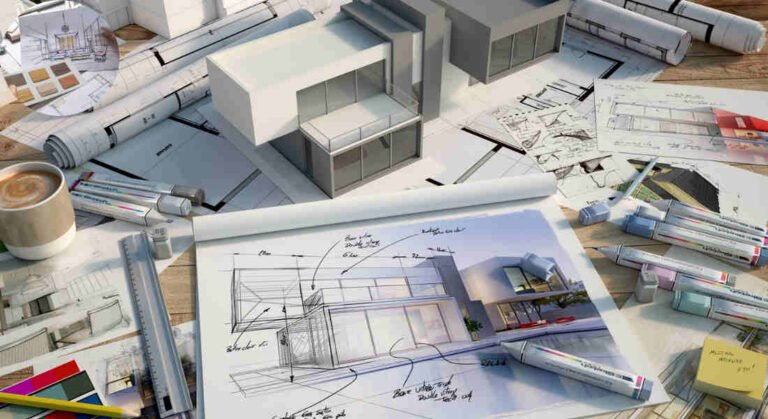In recent years, remote work has significantly reshaped many industries, including architecture. As more professionals embrace the flexibility of working from home, the architecture field has similarly adapted to meet the changing demands of its clients and employees.
Understanding Home Architecture as a Career

Definition and Scope of Home Architecture
Home architecture primarily focuses on designing residential buildings to ensure they meet the needs and preferences of their inhabitants. This discipline encompasses various elements, including aesthetics, functionality, safety, and sustainability. Architects working in this field must consider not only the physical structure but also how it harmonizes with the environment and the lifestyle of its occupants.
Key Skills and Qualifications Needed
To pursue a career in home architecture, aspiring architects should possess several key skills:
- Creativity: The ability to envision innovative designs that meet client needs.
- Technical Proficiency: Knowledge of architectural software, such as AutoCAD and SketchUp.
- Communication Skills: Effectively conveying ideas to clients and collaborating with team members.
- Problem-Solving Abilities: Addressing design challenges and regulatory requirements.
Typically, a degree in architecture is required, along with relevant certifications and experience.
Typical Career Paths and Opportunities
Home architects can explore various career paths, including:
- Residential Architect: Focusing solely on designing homes.
- Interior Designer: Concentrating on the interior space and aesthetics.
- Urban Planner: Involved in the broader context of community and urban development.
With the rise of remote work, opportunities for freelance and independent architects have also increased, allowing for greater flexibility.
Why Home Architecture is Gaining Popularity
The shift toward remote work has heightened the demand for personalized and functional living spaces. Homeowners are increasingly looking for designs that accommodate home offices and promote wellness. This trend has made home architecture a highly appealing career choice, especially for those who enjoy working closely with clients to create customized living solutions.
Addressing the Question: Is Home Architecture a Good Career?
Pros:
- Growing demand for residential designs.
- Opportunities for creativity and self-expression.
- Potential for a flexible work schedule.
Cons:
- Competitive job market.
- Project management challenges, especially when working remotely.
- Regulatory complexities in residential design.
In summary, while there are challenges, the pros often outweigh the cons, making home architecture a promising career choice for many.
How Remote Work is Transforming the Architecture Industry

Rise of Remote Work and Its Impact
The COVID-19 pandemic accelerated the trend of remote work, causing a significant shift in architectural practices. Architects can now collaborate with clients and colleagues from diverse locations, broadening their creative horizons and expanding networking opportunities.
You may also read (navigating permits for tiny homes on wheels).
Technological Advancements Enabling Remote Work
Technological tools have played a crucial role in facilitating remote work in the architecture industry. Key advancements include:
- Building Information Modeling (BIM): This enables architects to create detailed 3D models and collaborate more effectively.
- Cloud CAD Software: Allows for real-time updates and collaboration across teams.
- Collaboration Platforms: Tools like Slack and Zoom have become essential for communication and project management.
Shift to Flexible and Hybrid Work Models
As the architecture industry adapts, many firms have adopted flexible and hybrid work models. This shift has given architects the freedom to work from home or any location, enabling a better balance between personal and professional life.
Benefits of Remote Work for Architects
Remote work offers several advantages for architects, including:
- Flexibility: Architects can design their work environment to suit their preferences.
- Work-Life Balance: Reduced commute times allow for more time spent with family and pursuing personal interests.
- Global Collaboration Opportunities: Architects can work with clients and teams worldwide, enhancing their design perspectives.
The Impact of Remote Work on Home Architecture Design
Increased Demand for Personalized Home Office Spaces
As more people work from home, the need for dedicated home office spaces has surged. Architects are now focusing on creating designs that maximize productivity while ensuring comfort and well-being. This includes incorporating features such as soundproofing, ergonomic furniture, and ample natural light.
Trends in Home Design Influenced by Remote Work
Several design trends have emerged in response to the growing remote work culture:
- Natural Light: Designs that allow for abundant natural light can improve mood and productivity.
- Ventilation: Proper airflow is essential for maintaining a healthy workspace.
- Flexible Layouts: Spaces that can be easily reconfigured to suit various activities.
Integration of Smart Technology and Connectivity
Home architecture is increasingly incorporating innovative technology to enhance connectivity and convenience. Features such as bright lighting, smart thermostats, and integrated home office systems are becoming standard in modern designs.
How Architects Are Adapting Designs
Architects are continually adapting their designs to support remote work lifestyles. This includes creating multi-functional spaces that can transition from work to leisure, ensuring that homes not only accommodate professional needs but also enhance overall well-being.
Skills and Tools Essential for Home Architects in a Remote Work Era

Digital Tools and Software Critical for Remote Work
For architects working remotely, proficiency in various digital tools is essential. Key software includes:
- AutoCAD: For drafting and design.
- SketchUp: For 3D modeling.
- BIM Software: For managing complex projects.
Communication and Project Management Skills
Effective communication is vital in a remote setting. Architects must be adept at using collaboration tools and managing client expectations to ensure projects run smoothly.
Importance of Adaptability and Continuous Learning
The architectural landscape is continually evolving. Architects must remain adaptable and committed to continuous learning, whether through online courses, webinars, or industry publications.
Building a Strong Online Portfolio
In a digital age, having a robust online portfolio is crucial for attracting clients. Architects should showcase their best work, including residential designs and home office projects, to demonstrate their expertise and credibility.
Career Prospects and Growth Opportunities in Home Architecture
Market Demand for Residential Architects
The demand for residential architects, particularly those specializing in home office designs, is increasing. As more people adopt remote work, the demand for functional and aesthetically pleasing home spaces will continue to grow.
Potential for Specialization
Architects can differentiate themselves by specializing in areas such as:
- Sustainable Design: Focusing on eco-friendly materials and energy-efficient solutions.
- Smart Homes: Designing residences equipped with the latest technology.
- Ergonomic Interiors: Creating spaces that promote health and comfort.
You may also read (how do i get rid of sticky floor sat home).
Business Development Strategies for Remote Architects
To thrive in a remote work environment, architects should consider implementing the following strategies:
- Networking Online: Engage with other professionals and potential clients through social media and online forums.
- Marketing Services: Utilize digital marketing strategies to showcase unique offerings and attract clients.
Long-Term Career Growth and Earning Potential
With the growing emphasis on home architecture, there is significant potential for career growth. Experienced architects can command higher fees for their services, especially if they build a strong reputation in niche markets.
Challenges and Considerations in a Home Architecture Career

Common Challenges Faced by Architects Working Remotely
While remote work offers several benefits, it also presents challenges, such as:
- Communication Barriers: Misunderstandings can arise due to a lack of face-to-face interaction.
- Client Management: Managing client expectations can be more complex when working remotely.
Balancing Creativity and Collaboration
In a virtual environment, it can be challenging to foster creativity while ensuring effective collaboration. Architects must find ways to keep teams motivated and engaged, even when working remotely.
Navigating Licensing and Regulations
Architects must remain aware of licensing requirements and building regulations, which can vary by region. This knowledge is crucial for ensuring that designs meet all necessary standards and requirements.
Strategies to Overcome Challenges
To thrive in a remote work setting, architects can adopt several strategies:
- Establish Clear Communication Channels: Use tools that facilitate effective collaboration.
- Set Boundaries: Create a dedicated workspace to maintain focus and productivity.
- Stay Informed: Keep up with industry trends and regulatory changes to remain competitive.
How to Get Started in Home Architecture
Educational Pathways and Certifications
Aspiring architects should pursue a degree in architecture, followed by relevant certifications and professional development opportunities. Programs that focus on residential architecture can provide specialized knowledge and skills.
Gaining Experience
Internships and hands-on projects are invaluable for gaining practical experience. Working on real-world residential projects will enhance an architect’s skill set and portfolio.
Building a Portfolio Focused on Residential Design
A strong portfolio showcasing residential designs, including home offices, is essential for attracting clients. Architects should highlight their best work and any unique projects that demonstrate their expertise.
Networking and Marketing Yourself
In the digital age, networking is crucial. Architects can leverage social media platforms, attend virtual events, and engage in online communities to expand their professional networks.
Tips for Continuous Professional Development
To stay competitive, architects should prioritize ongoing professional development. This can include attending workshops, participating in online courses, and subscribing to industry publications.
Future Outlook: The Evolution of Home Architecture Careers
Predictions on Remote Work Influence
As remote work remains a prominent feature of modern life, home architecture is likely to continue evolving. Architects will need to stay adaptable and innovative to meet the evolving demands of their clients.
Emerging Technologies and Trends
Emerging technologies, such as virtual reality and augmented reality, are set to transform the architecture field. These tools will enhance design capabilities and client presentations.
You may also read (a guide to arcades in ottonian home design).
